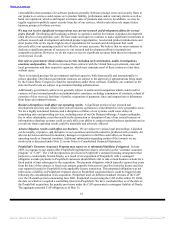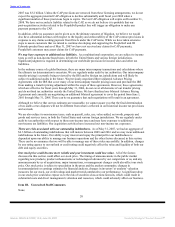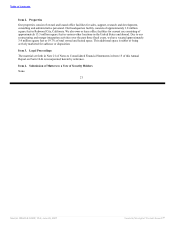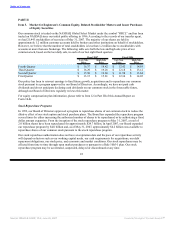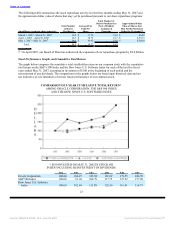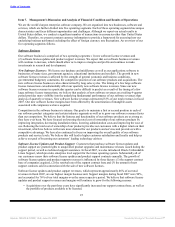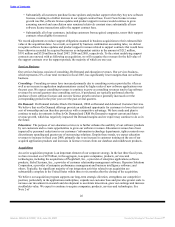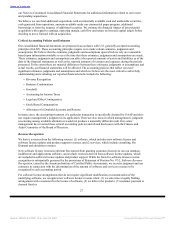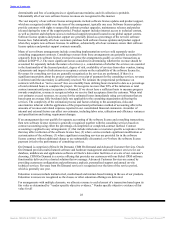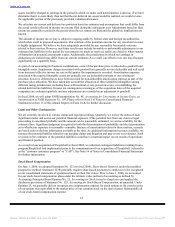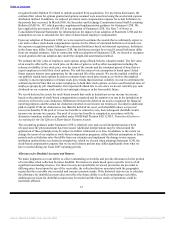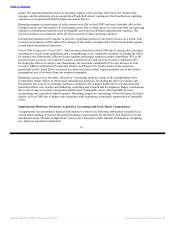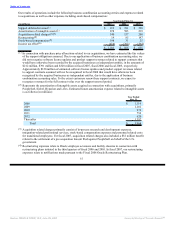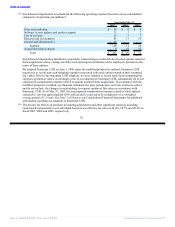Oracle 2006 Annual Report Download - page 33
Download and view the complete annual report
Please find page 33 of the 2006 Oracle annual report below. You can navigate through the pages in the report by either clicking on the pages listed below, or by using the keyword search tool below to find specific information within the annual report.
Table of Contents
elements of an arrangement is based upon the normal pricing and discounting practices for those products and
services when sold separately and for software license updates and product support services, is additionally
measured by the renewal rate offered to the customer. We may modify our pricing practices in the future,
which could result in changes in our vendor specific objective evidence of fair value for these undelivered
elements. As a result, our future revenue recognition for multiple element arrangements could differ
significantly from our historical results.
We defer revenue for any undelivered elements, and recognize revenue when the product is delivered or over
the period in which the service is performed, in accordance with our revenue recognition policy for such
element. If we cannot objectively determine the fair value of any undelivered element included in bundled
software and service arrangements, we defer revenue until all elements are delivered and services have been
performed, or until fair value can objectively be determined for any remaining undelivered elements. When
the fair value of a delivered element has not been established, we use the residual method to record revenue if
the fair value of all undelivered elements is determinable. Under the residual method, the fair value of the
undelivered elements is deferred and the remaining portion of the arrangement fee is allocated to the delivered
elements and is recognized as revenue.
Substantially all of our software license arrangements do not include acceptance provisions. However, if
acceptance provisions exist as part of public policy, for example in agreements with government entities when
acceptance periods are required by law, or within previously executed terms and conditions that are
referenced in the current agreement and are short-term in nature, we provide for a sales return allowance in
accordance with FASB Statement No. 48, Revenue Recognition when Right of Return Exists. If acceptance
provisions are long-term in nature or are not included as standard terms of an arrangement or if we cannot
reasonably estimate the incidence of returns, revenue is recognized upon the earlier of receipt of written
customer acceptance or expiration of the acceptance period.
We also evaluate arrangements with governmental entities containing “fiscal funding” or “termination for
convenience” provisions, when such provisions are required by law, to determine the probability of possible
cancellation. We consider multiple factors, including the history with the customer in similar transactions, the
“essential use” of the software licenses and the planning, budgeting and approval processes undertaken by the
governmental entity. If we determine upon execution of these arrangements that the likelihood of cancellation
is remote, we then recognize revenue once all of the criteria described above have been met. If such a
determination cannot be made, revenue is recognized upon the earlier of cash receipt or approval of the
applicable funding provision by the governmental entity.
We assess whether fees are fixed or determinable at the time of sale and recognize revenue if all other
revenue recognition requirements are met. Our standard payment terms are net 30; however, terms may vary
based on the country in which the agreement is executed. Payments that are due within six months are
generally deemed to be fixed or determinable based on our successful collection history on such
arrangements, and thereby satisfy the required criteria for revenue recognition.
While most of our arrangements include short-term payment terms, we have a standard practice of providing
long-term financing to credit worthy customers through our financing division. Since fiscal 1989, when our
financing division was formed, we have established a history of collection, without concessions, on these
receivables with payment terms that generally extend up to five years from the contract date. Provided all
other revenue recognition criteria have been met, we recognize new software license revenues for these
arrangements upon delivery, net of any payment discounts from financing transactions. We have generally
sold receivables financed through our financing division on a non-recourse basis to third party financing
institutions. We account for the sale of these receivables as “true sales” as defined in FASB Statement
No. 140, Accounting for Transfers and Servicing of Financial Assets and Extinguishments of Liabilities.
Our customers include several of our suppliers and on rare occasion, we have purchased goods or services for
our operations from these vendors at or about the same time that we have licensed our software to these same
companies (a “Concurrent Transaction”). Software license agreements that occur within a three-month time
period from the date we have purchased goods or services from that same customer are reviewed for
appropriate accounting treatment and disclosure. When we acquire goods or services from a customer, we
negotiate the purchase separately from any software license transaction, at terms we consider to be at arm’s
length, and settle the purchase in cash. We
29
Source: ORACLE CORP, 10-K, June 29, 2007 Powered by Morningstar® Document Research℠


